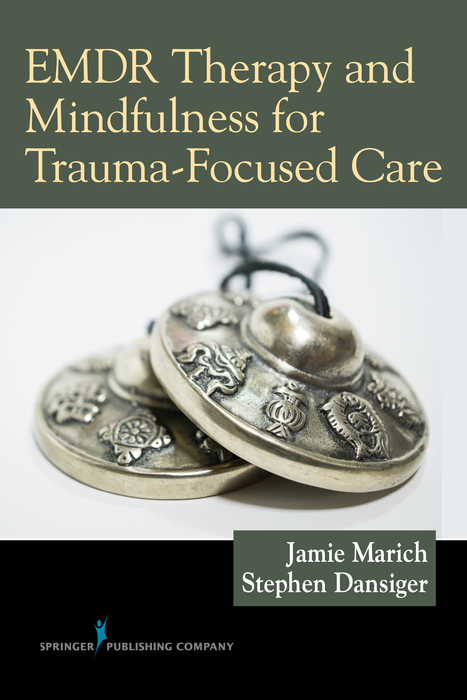EMDR therapy and mindfulness for trauma-focused care
The book demonstrates how clinicians can conceptualize and deliver trauma-focused care in both mental health and addiction treatment.
About the Book
“Based on the belief that mindfulness is a critical component in the delivery of EMDR, this innovative text integrates mindfulness-informed practice with EMDR therapy to create an effective new approach for healing trauma. Based on current evidence-based research, the book demonstrates―with clear, step-by-step guidelines―how clinicians can conceptualize and deliver trauma-focused care in both mental health and addiction treatment. Infused with practical applications, the book offers clearly articulated and effective approaches that provide a concrete beginning, middle, and end of treatment planning.
Following a description of the long history of mindfulness practices, the book offers guidelines for developing one’s own mindfulness practice―emphasizing the use of trauma-focused language―and suggestions for teaching specific techniques to clients. The book describes both classic and creative mindfulness practices, including breath awareness/sensory grounding, breath meditation, body scanning, feeling tone meditation, labeling, standing meditation, walking meditation, and loving-kindness meditation, along with using day-to-day objects as a meditative focus, movement practices, the expressive arts, and other forms of creativity.
Key Features:
- Offers a complete framework for healing trauma by integrating mindfulness-informed practice with EMDR therapy
- Provides clearly articulated, step-by-step approaches that are evidence-based
- Authored by noted experts in EMDR and mindfulness-based therapies
- Includes guidelines for developing one’s own mindfulness practice and tools for teaching specific practices to clients
- Describes both classic and creative mindfulness practices”
—Description from publisher
Table of Contents
1. Introduction
2. Redefining the Paradigm for Trauma-Focused Care
3. Developing Buddhist Mindfulness Practice for Trauma-Focused Care
4. An Introduction to the Creative Mindfulness Practices
5. EMDR Phase 1, Client History—Setting the Tone for Trauma-Focused Services
6. EMDR Phase 2, Preparation in Trauma-Focused Care
7. EMDR Phases 3 to 6: Principles of Mindful Decision Making
8. Special Situations in Phases 3 to 6: Mindful Facilitation Through Abreaction, Dissociation, and Resistance
9. EMDR Phases 7 and 8: Mindfully Approaching What We Often Overlook
10. Enhancing Your Efficacy as a Therapist: Developing Your Own Mindfulness Practice and Doing Your Own Trauma Work
—Description from publisher
Book Access
Purchase/Subscription Required
Marich, J., & Dansiger, S. (2018). EMDR therapy and mindfulness for trauma-focused care. New York, NY: Springer Publishing.
- ISBN: 0826149146
About the Author(s)
Jamie Marich, Ph.D., LPCC-S, LICDC-CS, REAT, RMT travels internationally teaching on EMDR therapy, trauma, addiction, expressive arts therapy and mindfulness while maintaining a private practice in Warren, OH.
Stephen Dansiger, Psy.D., MFT played CBGB and Max’s Kansas City in the late 70’s; drank, played drums in a toy rock band and then got into recovery in the late 80’s; became an international social justice/diversity educator and rocker again in the 90’s; and is now a consultant, trainer, clinician, writer and meditation teacher. Dansiger has become a master EMDR therapist and provider of EMDR Training and Advanced Topics Courses with the Institute for Creative Mindfulness and is a pioneer in the Buddhist recovery field. He is the creator and founder of the MET(T)A Protocol (Mindfulness and EMDR Treatment Template for Agencies) which utilizes Buddhist psychology, mindfulness and EMDR therapy to create an agency’s primary clinical practice system. Dansiger is the Head of Health & Wellness Innovation and Partnerships at DropLabs, a leading sound and vibration technology company. He is a Founding Member of the Society for Health Care Innovation, an outgrowth the Master of Health Care Innovation (MHCI) program at the University of Pennsylvania, where he is in the 3rd cohort.
—Description from publisher
Date
November 23, 2017
Creator(s)
Jamie Marich, Stephen Dansiger
Topics
Addictions
Practice & Methods
Mindfulness





